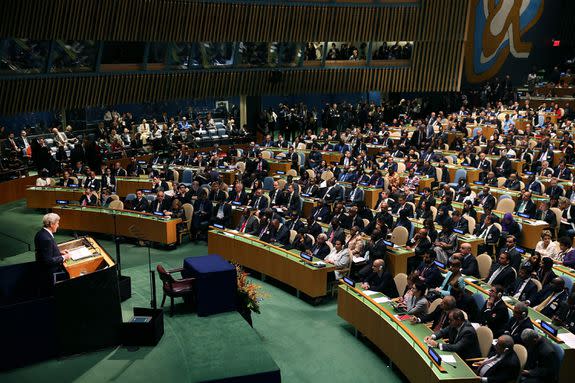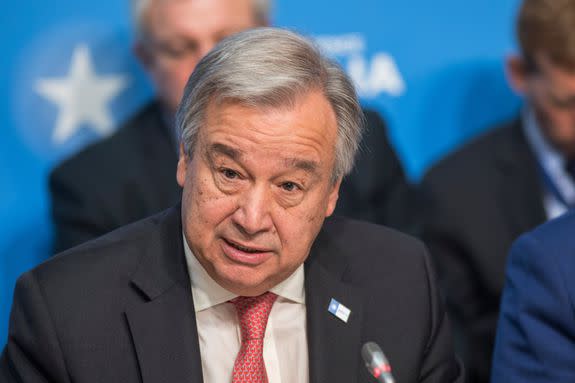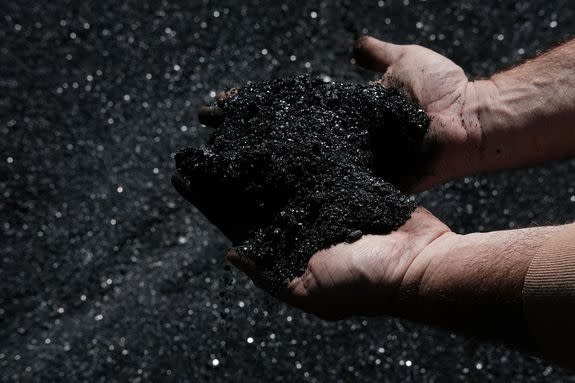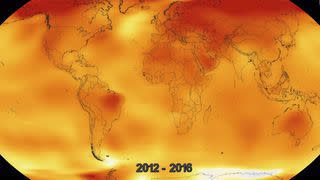U.S. could be 'left behind' if Trump exits the Paris Climate Agreement

The head of the United Nations has a clear message for countries and companies dragging their feet on climate change: "Get on board, or get left behind."
U.N. Secretary-General António Guterres on Tuesday said institutions that "fail to bet on the green economy will be living in a gray future," while those that embrace clean energy technologies will "set the gold standard for economic leadership in the 21st century."
Guterres didn't explicitly throw shade at the United States, but he may has well have.
SEE ALSO: Trump's budget screws over climate research, but don't freak out yet
Under President Donald Trump, the U.S. has begun dismantling its ambitious plans to slash greenhouse gas emissions and curb fossil fuel use, at a time when the rest of the world is doubling down on both fronts.
The Trump administration is also considering pulling the U.S. from the Paris Climate Agreement, a historic international accord that aims to limit global temperature rise.

Image: spencer platt/Getty Images
Trump's top environmental official, Scott Pruitt, who heads the Environmental Protection Agency, has called the Paris agreement a "bad deal" and is one of the strongest advocates of ending U.S. participation in the pact. Pruitt met with Trump on Tuesday ahead of the president's upcoming decision, a fact that made climate advocates particularly nervous.
If America withdraws, it would be only the third nation in the world — after Syria and Nicaragua — to abstain. The U.S. may also become a clean energy laggard, as manufacturers and investors flock to China, India, Europe, and other nations that more openly embrace the low-carbon economy.
The U.N. secretary general, in his first major climate address since taking office in December, said it's "absolutely essential that the world implements the Paris agreement — and that we fulfill that duty with increased ambition."
When asked about a possible U.S. exit, Guterres said the U.N. was "engaging with the American administration."
"We believe it will be important for the United States not to leave the Paris agreement," he added.
"My door is open to all who wish to discuss the way forward, even those who might hold divergent perspectives," he said earlier in the address. "The climate conversation should cease to be a shouting match."

Image: Jack Hill - WPA Pool/Getty Images
The Paris Agreement, which went into force in 2016, calls for nations to cut greenhouse gas emissions in order to limit global warming to "well below" 2 degrees Celsius, or 3.6 degrees Fahrenheit, above preindustrial levels by 2100.
Yet the Paris agreement isn't the only place where the U.S. and U.N. diverge on climate issues. Trump and his top officials, including Pruitt, have also disputed the U.N.'s widely accepted finding that "human influence on the climate system is clear."
In his speech, Guterres said "the science [of climate change] is beyond doubt." He noted that climate-related impacts, including rising sea levels, devastating floods, and long-lasting droughts, "are dangerous, and they are accelerating."
Trump, meanwhile, has repeatedly expressed skepticism toward the mainstream scientific consensus on climate change.

Image: spencer platt/Getty Images
On Tuesday, a reporter asked White House press secretary Sean Spicer if Trump believes that human activity contributes to global warming.
Spicer replied, "Honestly, I haven't asked him."
Still, the federal government isn't the only place where Americans can fight climate change, Guterres noted. Local governments, civil organizations, and especially businesses — whose energy investments will stall or propel the low-carbon economy— all have an important role to play.
Even if the U.S. withdraws, "it's very important for the U.S. society as a whole, the cities, the states, the companies, the businesses, to remain engaged with the Paris agreement," Guterres said.
WATCH: It's official, 2016 was Earth's warmest year on record

